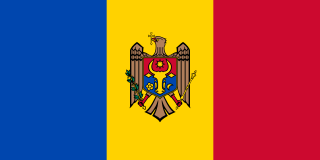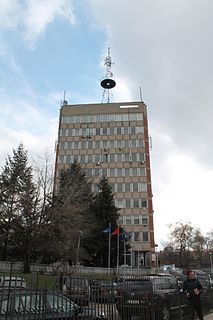
A tabloid is a newspaper with a compact page size smaller than broadsheet. There is no standard size for this newspaper format.

The BBC World Service is an international broadcaster owned and operated by the BBC. It is the world's largest of any kind. It broadcasts radio news, speech and discussions in more than 40 languages to many parts of the world on analogue and digital shortwave platforms, internet streaming, podcasting, satellite, DAB, FM and MW relays. In 2015, The World Service reached an average of 210 million people a week. In November 2016, the BBC announced that it would start broadcasting in additional languages including Amharic and Igbo, in its biggest expansion since the 1940s.

Die Zeit is a German national weekly newspaper published in Hamburg in Germany. The newspaper is generally considered to be among the German newspapers of record and is known for its long and extensive articles.

Metro is the United Kingdom's highest-circulation print newspaper. It is published in tabloid format by DMG Media. The free newspaper is distributed from Monday to Friday mornings on trains and buses, and at railway/Underground stations, airports and hospitals across selected urban areas of England, Wales and Scotland. Copies are also handed out to pedestrians.
Der Standard is an Austrian daily newspaper published in Vienna.

There are several different types of mass media in the United Kingdom: television, radio, newspapers, magazines and websites. The country also has a strong music industry. The United Kingdom has a diverse range of providers, the most prominent being the publicly owned public service broadcaster, the British Broadcasting Corporation (BBC). The BBC's largest competitors are ITV plc, which operates 13 of the 15 regional television broadcasters that make up the ITV Network, and American global media conglomerate Comcast, which owns the broadcaster Sky Ltd. Regional media is covered by local radio, television and print newspapers. Trinity Mirror operates 240 local and regional newspapers, as well as national newspapers such as the Daily Mirror and the Sunday Mirror.

Khaleej Times is a daily English language newspaper published in Dubai, United Arab Emirates. Launched on April 16, 1978, Khaleej Times is the UAE's longest-running English daily newspaper.
The mass media in Turkey includes a wide variety of domestic and foreign periodicals expressing disparate views, and domestic newspapers are extremely competitive. However, media ownership is concentrated in the hands of a few large private media groups which are typically part of wider conglomerates controlled by wealthy individuals, which limits the views that are presented. In addition, the companies are willing to use their influence to support their owners' wider business interests, including by trying to maintain friendly relations with the government. The media exert a strong influence on public opinion. Censorship in Turkey is also an issue, and in the 2000s Turkey has seen many journalists arrested and writers prosecuted. On Reporters Without Borders' Press Freedom Index it has fallen from being ranked around 100 in 2005 to around 150 in 2013.
Thailand has a well-developed mass media sector, especially by Southeast Asian standards. The Thai government and the military have long exercised considerable control, especially over radio and TV stations. During the governments of Thaksin Shinawatra and the subsequent military-run administration after the 2006 coup and military coup of 2014, the media in Thailand—both domestic and foreign—have suffered from increasing restrictions and censorship, sometimes subtle, sometimes overt.
The Cambodia Daily is an English and Khmer language news site that writes and aggregates news about Cambodia. It was originally an English-language daily newspaper based in Cambodia from 1993 to 2017.

Scottish media has a long and distinct history. Scotland has a wide range of different types and quality of media.
The South Korean mass media consist of several different types of public communication of news: television, radio, cinema, newspapers, magazines, and Internet-based websites.

The Vienna Review was founded in 2006 by American journalist and director of the Vienna Journalism Institute Dardis McNamee. It was a monthly English language newspaper based in Vienna, Austria, available in print and online. The paper's target audience was the permanent English-speaking community in Austria and Central Europe, as well as expatriates and tourists.
Latvia is one of the three post-Soviet Baltic states having regained independence in 1991 and since 2004 is a member State of the European Union. After its independence there have been fundamental changes of political, economic and social nature that have turned Latvia into a democratic country with a free market economy. This reflects on the mass media landscape which is considered well-developed despite being subjected to a limited market and a linguistic and cultural split between Latvian (58.2%) and Russian speakers (37.5%). In 2017 Freedom House defined Latvia's press freedom status as “free", assigning to the country's press freedom a score of 26/100. The 2017 World Press Freedom Index prepared annually by Reporters Without Borders (RSF) states that media in Latvia have a "two-speed freedom", underlying different levels of freedom for Latvian-language and Russian-language media. According to RSF's Index the country is ranked 28th among 180 countries.

The mass media in Moldova refers to mass media outlets based in the Republic of Moldova. Television, magazines, and newspapers are all operated by both state-owned and for-profit corporations which depend on advertising, subscription, and other sales-related revenues. The Constitution of Moldova guarantees freedom of speech. As a country in transition, Moldova's media system is under transformation.
The mass media in Russia refers to mass media outlets based in the Russian Federation. The media of Russia is diverse, with a wide range of broadcast and print outlets available to the consumers. Television, magazines, and newspapers are all operated by both state-owned and for-profit corporations which depend on advertising, subscription, and other sales-related revenues. Even though the Constitution of Russia guarantees freedom of speech the country is plagued by both government and self-censorship. As a country in transition, Russia's media system is under transformation.

A newspaper is a periodical publication containing written information about current events and is often typed in black ink with a white or gray background.

The Express Tribune is a Pakistani daily English-language newspaper based in Pakistan. Part of the Lakson Group of companies, it is the flagship publication of the Daily Express media group. It is Pakistan's only internationally affiliated newspaper, in partnership with International New York Times, the global edition of The New York Times. Headquartered in Karachi, it also prints copy from offices in Lahore, Islamabad and Peshawar. It was launched on 12 April 2010, in broadsheet format, with news design distinctive from traditional Pakistani newspapers.
The mass media in South Sudan is underdeveloped compared to many other countries, including fellow East African states like Kenya, Tanzania, and Uganda. Poor transportation infrastructure and entrenched poverty in the country inhibit both the circulation of newspapers, particularly in states located far from the capital of Juba, and the ability of media outlets to maintain regular coverage of the entire country.

The mass media in Kosovo consists of different kinds of communicative media such as radio, television, newspapers, and internet web sites. Most of the media survive from advertising and subscriptions.











